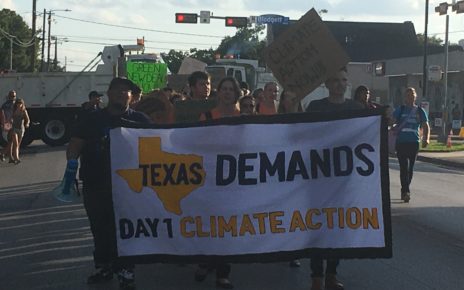Editors Note: In the hours after publication of this article, Sen. Joe Manchin announced that he had agreed to vote for $369 billion in funding for climate and energy. The bill has not come for a vote, and details on its contents are still emerging. Our original article, published before Manchin’s announcement, remains unaltered.
An unprecedented heatwave has broken records on multiple continents this summer, spreading wildfires, drought, death, and other disruptions throughout the globe. Although heatwaves occurred before fossil fuel emissions reached dangerous levels, the severity of the summer 2022 heatwave, which has swept through every major region of the world, is a result of human-caused climate change, and it comes just as many politicians have either failed to live up to the pledges of the Paris Climate Accords or even taken steps to ramp up the production of fossil fuels, the main driver of the ongoing climate collapse.
United States
In the United States, 28 states issued Heat Advisories or Excessive Heat Warnings last week, according to the National Weather Service. In the past week, 359 high-temperature records have been set or tied in the United States, and more than 700 records for the highest overnight low temperatures were set or tied, according to a report in Axios citing data from NOAA. In the past 30 days, those numbers are more than 1,400 and 2,800, respectively.
In California, the heat has contributed to yet another devastating fire season, with the Oak Fire in Mariposa County near Yosemite National Park already burning more than 18,000 acres since it started on Friday, July 22. The fire is 26% contained as of Tuesday evening, and it has threatened 2,700 structures and forced about 6,000 Californians to evacuate, according to the Sacramento Bee.
Fire has been a problem beyond California, including in Texas, where highs have been over 110 degrees Fahrenheit. The extreme heat has pushed the electrical grid to its limits as people crank up their A/C units, with the Electric Reliability Council of Texas (ERCOT) warning Texans to conserve energy and be prepared for rolling blackouts. The Texas grid hit an all-time high for electricity demand this month, leading some energy providers to raise rates.
“Furious doesn’t cover it,” reflected one Twitter user from Collin County, Texas whose electricity bill was nearly $600. Other homeowners in the area reported bills as high as $900 and increases of more than $200 from the previous month, despite following ERCOT’s recommendation of keeping A/C units set at 78 degrees.
With climate change directly impacting Americans’ pocketbooks, there have been renewed calls for the Biden administration to take effective action. On July 20, President Biden signed executive orders that will devote $2.3 billion to expanding offshore wind, establishing air-conditioned public spaces for people to cool off, and providing modest assistance to low-income families to cool their homes. The actions, however, stopped short of declaring a climate emergency, and so far the Biden administration has shown reluctance to pressure Senator Joe Manchin (D-WV) to support any lasting climate-related legislation in Congress where he is the chairman of the Senate Energy and Natural Resources Committee.
Military budget: $840 billion
Semiconductors: $52 billion
Police expansion: $37 billion
Climate change: $2 billion pic.twitter.com/D319FgOfwC— Adam Best (@adamcbest) July 24, 2022
The U.S. Congress also announced a plan to spend $37 billion on policing. Mass incarceration is also a climate change issue, and extreme heatwaves often impact incarcerated people more severely than the general population. A recent report in Truthout documents how U.S. prisons routinely lack adequate air conditioning, if they have air conditioning at all. Since 1998, there have been 23 documented deaths of incarcerated individuals due to extreme heat, but heat-related illnesses are not always properly documented.
Europe
Meanwhile, in Europe, the heatwave is also wreaking havoc on the electrical grid in France, where six nuclear power plants have been forced to reduce their output because the river water used to cool the reactors has become too hot. As a result, half of France’s nuclear reactors went offline, according to the Express.
Europe already faces a major energy crisis due to the ongoing war in Ukraine. In retaliation to sanctions by the United States and other NATO member states, Russia has cut the amount of natural gas it sends to Europe through the NordStream pipeline. In response, Germany has restarted previously closed coal power plants to make up for the loss of Russian gas at a time when climate scientists are warning we have to stop burning fossil fuels, especially coal, as fast as possible to avoid ever-worsening heatwaves and other extreme weather events.
At least 30 fires have been stamped out across Spain since Sunday as Europe suffers from an intense heatwave. On a train from Madrid to Ferrol, passengers found themselves between a forest fire with flames on each side of the train.https://t.co/vtpvdef4At pic.twitter.com/DPsBOlL3aq
— Newsweek (@Newsweek) July 18, 2022
In the United Kingdom last week, extreme heat took a toll on transportation. Workers had to spread road grit over the streets out of fear they may melt. People were urged not to take public transportation because train tracks may warp in the heat. Schools moved classes online. Concerned citizens also took the opportunity to protest the drivers of climate change, with the group Doctors of Extinction Rebellion (XR) staging a demonstration at the JP Morgan building in London.
In a press release from Doctors of XR, Dr. Juliette Brown, a Consultant Psychiatrist who took part in the action, said: “This week may see the hottest day in recorded history in the UK, putting my patients – people with dementia and with serious mental illness – at very high risk from heat stress. It’s absolutely my professional duty to sound the alarm just as so many other health workers, scientists, activists and leaders are doing. By continuing to profit from fossil fuel interests JP Morgan are knowingly fueling this climate crisis.”
The heat in the UK has defied climate models by the country’s Meteorological Office, which predicted the high temperatures hitting the UK this week would be expected in 2050. Instead, those predicted temperatures are coming nearly 30 years early — a sign that many climate change models may be underestimating the speed at which the earth is already warming.
On the left is a 2020 Met Office prediction of what a 2050 summer heatwave could look like.
On the right is a BBC weather forecast made this morning, for this coming Tuesday.
The Climate Crisis is real and it’s happening now. Wake the f**k up. pic.twitter.com/9ZMMIrveFY
— Cai Parry (@CaiParryUK) July 15, 2022
Africa and The Middle East
Around the Persian Gulf, extreme humidity paired with the heat to raise the “feels like” temperature to 126 degrees in Doha, Qatar not during the heat of the day, but at midnight after the sun has long gone down, according to data from the University of Maine. This comes just weeks after a heatwave mostly affecting Saudi Arabia, Iraq, Iran and Kuwait sent actual temperatures into the 120s earlier in July.
The most humid place on Earth, the Persian Gulf has scorching water temperatures as high as 95F (35C).
The capital of Qatar, located along the Persian Gulf, currently has a mind-blowing “feels like” temperature of 126F at midnight.
Next level humidity. pic.twitter.com/nTsLyaRV9B
— US StormWatch (@US_Stormwatch) July 22, 2022
The heat also impacted Egypt and the rest of North Africa. Last week, as temperatures soared across the Mediterranean Sea region, fires broke out across Morocco and have burned about 25,000 acres so far, forcing thousands to flee their homes and causing two deaths. In response, the government of Morocco announced a plan to spend $28 million mitigating the effects of the fires and restoring vegetation, according to the North Africa Post.
The most severe impacts, however, are being felt in the Horn of Africa and particularly Somalia, where four consecutive failed rainy seasons have ushered in the region’s worst drought in four decades. The famine induced by this climate shock has rendered 89 million people “acutely food insecure,” as children die of starvation, and an estimated 1.5 million children under the age of five are expected to face acute malnutrition by the end of the year.
Somalia is on the brink of famine because of a deadly drought gripping east Africa.
Seven million people are threatened by starvation and thousands have died.@PeterAdamSmith, @rooITV and @andyrex54 have this special reporthttps://t.co/51p81HF0cV pic.twitter.com/zBpp9dZKEJ
— ITV News (@itvnews) July 25, 2022
As climate change continues to impact Africa, many Africans are ramping up the pressure on their governments to stop fossil fuel expansion. In the Democratic Republic of the Congo (DRC), Greenpeace Africa and Extinction Rebellion recently delivered a petition with more than 100,000 citizens’ signatures asking President Félix Tshisekedi to stop auctioning off wildlands to the oil and gas industry, and cease the creation of any new oil and gas operations in the country.
In a statement, Justin Mutabesha of the Association des Jeunes Visionnaires RDC said: “With the auctioning of oil blocks, local communities are being held hostage by political-economic elites. The exploitation of Congolese oil implies the disappearance of immense parts of the biodiversity on which 100 million people depend for fishing, agriculture and other traditional practices. It also involves the continued neglect of alternatives to renewable energy. We say no to this sale.”
Asia
Further to the East, the heatwave affecting India and Pakistan began with an abnormally hot Spring season when temperatures in Delhi, a city with double the population of New York City, hit 100 degrees for 85 days out of a 100-day stretch, according to the New York Times. In Pakistan, the extreme heat in May accelerated the melting of the country’s 7,000 glaciers and hurt its ability to grow key crops such as wheat, which has historically been an important export for Pakistan’s economy.
A tailor and resident of Lahore named Muhammad Junaid told reporters with Al Jazeera: “We have no money to buy an air-conditioner. We rely on fans and cheap coolers … but when there is no electricity for several hours, we have nothing to stay cool with. We just have to live with it.”
Now India and Pakistan have moved into the monsoon season, which is also more severe because of climate change, but the current July 2022 heatwave has severely impacted China. Almost 70 cities have declared severe heat warnings impacting tens of millions of people. Reuters is reporting that in Xinjiang Province, an area roughly twice the size of France, the government has warned people of the dangers posed by flash floods and mudslides caused by melting glaciers.
Tipping Points
The ongoing heatwave illustrates how interconnected the global climate truly is, as it worsens drought in the United States, shuts down reactors in Europe, melts glaciers in Asia, and causes famine in Africa. Additionally, in Greenland, satellite imagery shows ice sheets melting at a rapid rate, as temperatures have been in the 60s, according to the Independent. The heat reportedly melted nearly six billion tonnes of ice in only three days, scientists said.
The effects of rising sea levels could also be seen last week in Hawaii where historic 20-foot waves swelled along the coast, drenching homes and businesses, flooding roads, disrupting an oceanside wedding, and yes, delighting local surfers. “It’s the largest it’s been in several decades,” a Honolulu-based National Weather Service official told NBC News.
This is nuts. Thought the wave had been destroyed. Obviously not! pic.twitter.com/GCJOmvDRV0
— CARVE Surfing Magazine (@CarveMag) July 20, 2022
While the surfers may be happy right now, the long-term impacts of sea-level rise will be damaging for humanity as tens of millions of people living in coastal regions face displacement and the destruction of their homes. As increased heat also increases the severity of wildfires, those fires release even more carbon dioxide into the atmosphere, further driving climate change forward, leading to more extreme weather and sea-level rise. The dangerous situation is made worse by governments that encourage continued expansion of fossil fuel infrastructure, such as the Conoco Phillips Willow Project in Alaska and offshore drilling in the UK’s North Sea, and proposed expansion of gas export terminals in Texas that also threaten sacred Indigenous land.
Food sovereignty
With climate change raising temperatures around the world, people are increasingly looking for ways to stay cool, which can be especially challenging in cities where what’s known as the urban heat island effect already makes “concrete jungles” much hotter than rural areas and actual jungles. The bigger but less immediate challenge humans face, however, is the impact continued heatwaves will have on agriculture and the global food supply chain.
We may find some hope in the fact that holistic solutions can address both of these issues via incorporating food forests and permaculture design into rethinking how our cities work. A 2019 case study from South Korea found that four simple “street-level” techniques could effectively reduce urban heat: “green walls, sidewalk greenways, reduced-albedo sidewalks and street trees.” Of these techniques, the very trees missing from so-called “concrete jungles” were found to be the most effective.
Choosing tree species that are adapted for high heat is critical, and depending on the climate, fruit and nut trees may also be suitable. Indigenous people have long used place-based regenerative agriculture techniques to enhance food security and food sovereignty. Many of these techniques also have a positive impact on the climate, by pulling carbon dioxide out of the atmosphere and putting it back in the soil.
In addition to agroforestry and green urban design, Indigenous leaders such as Winona La Duke have emphasized the role of hemp agriculture in reversing climate change and supporting Indigenous food sovereignty. At the 4th Annual Indigenous Hemp Conference last year, La Duke said: “In our prophecies, we talk about the time of the seventh fire, and this change – we have a choice between a scorched path – well worn – and a green path. There’s no time like the present to see the clarity of that moment. And if anything is the green path, it is this hemp path that can do anything that fossil fuels can do.”




